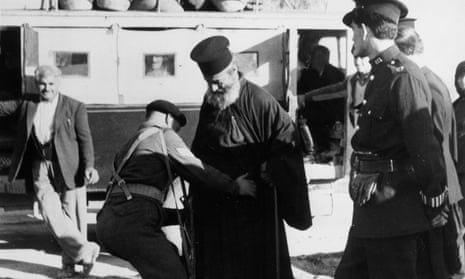The British government has said it will pay £1m in compensation to a group of Greek Cypriots following claims of human rights abuses during the island’s struggle for independence.
In a statement that expressed regret, if not responsibility, for the actions of imperial officers, the minister of state for Europe, Sir Alan Duncan, announced the UK had reached an out-of-court settlement with 33 former members of Eoka, the armed guerrilla group that led the campaign to end British rule in Cyprus in the mid-1950s.
“The UK government has agreed to pay a settlement sum of £1m in damages with an amount in legal costs to be determined by the court in due course,” he said, adding the agreement did not constitute an admission of liability.
“It is a matter of regret for the UK government that the transition of Cyprus from British administration to independence should have been preceded by five years of violence and loss of life, affecting all residents of the island.”
Now in their 80s, the Greek Cypriots filed the class action lawsuit four years ago. Two women were among the victims, whose claims of brutal treatment at the hands of British colonial forces ranged from rape to beatings and water boarding.
The legal action followed a successful attempt by more than 5,000 Kenyans to win damages for torture and abuse suffered during the Mau Mau uprising in the 1950s. Using similar language when the settlement was announced in 2013, the then foreign secretary, William Hague, said the British government had decided to pay nearly £20m in costs and compensation to the Kenyans in “full and final settlement” of the claims.
The Birmingham-based law firm representing the Greek Cypriots described the attempt at redress as going some way “to putting right a historic wrong”. It said ultimately the violent events of the Emergency period in Cyprus would be left to the judgment of historians, rather than a court, to evaluate.
“During the course of the litigation, four of the claimants died and a further four lost mental capacity,” the firm, KJ Conroy & Co, said in a statement. “The remaining claimants are all very elderly and, had the dispute continued for much longer, very few of them would have been able to enjoy their settlement payments.”
But Eoka veterans, who had pressed for union with Greece at the time of the upheaval, said the desire to see justice meted out had never been motivated by money.
“What are we going to do with the money at our age? What we want is an apology,” Thassos Sophocleous, the lead claimant, told the Guardian, speaking from Nicosia, the Cypriot capital.
Sophocleous, a retired headmaster who spent 26 months in prison in the UK before Cyprus gained independence in 1960, said more than 50 years later many of the victims still bore scars as much in mind as in body.
“Some were left blind, or with spinal injuries, or deaf,” added the 86-year-old, who heads the Eoka veterans’ association. “But the scars are as much mental. It was inhuman treatment. We have nothing against the English now, it is history, but if the Germans can say sorry, the English should say sorry too.”
Britain’s desire to retain close ties with Cyprus, where it continues to have military bases, during the Brexit process is also believed to have played a role in the settlement decision.
“The government is fighting so many battles on so many fronts, it’s in such disarray that to spend any more time on this would not have been the best use of government resources,” said the Labour MP Bambos Charalambous, whose family hailed from Cyprus. “I am very glad it finally saw sense and settled what would have been a very embarrassing situation had the case continued through the courts.”
In his statement, Duncan stressed the need to look forward. “We must not forget the past – and indeed we must learn from it,” he said. “But it is most important to look to the future. Today, the bilateral relationship that the UK shares with Cyprus is one of friendship and close partnership.”
